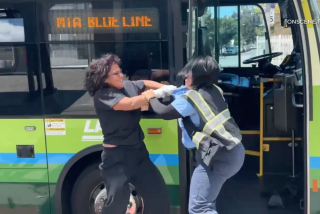AIDS Clinics Fear Bus Strike’s Effects
In another example of the MTA strike’s disproportionate effect on the most vulnerable people in society, HIV and AIDS clinics in Los Angeles County have reported missed appointment rates as high as 50% since bus drivers walked off work in mid-September.
Many health care facilities report more missed patient appointments overall, but some health officials are especially concerned about the effects of the strike on the thousands of low-income, HIV-positive patients in the county because consistent monitoring, dosages and adjustments are crucial elements of the drug cocktail programs many patients use to combat the virus.
“One of the really important things with the new cocktail medications is adherence to both the medical appointments and the therapies,” said Mark Henrickson, director of the Northeast Valley Health Corporation’s HIV services division in Van Nuys. “If people can’t get [to clinics] for monitoring of their blood levels, they’re going to be hit with potential long-term consequences.”
Northeast Valley’s HIV clinic is one of those most seriously affected by the strike, with 70 no-shows since Sept. 18, Henrickson said.
The L.A. Gay & Lesbian Center’s Lambda Medical Group, which operates a number of special HIV programs in Los Angeles among its general health care services for the gay community, reports a no-show rate of 25%.
Last week, the AIDS Healthcare Foundation, which operates seven clinics in Los Angeles County, saw 15% fewer patients than normal. Keith Waterbrook, the director of health services for the Gay & Lesbian Center, said that with the strike only three weeks old, its effects haven’t been devastating for bus-dependent HIV patients--yet.
“There’s flexibility,” Waterbrook said. “If you miss an appointment this week it’s not that horrible, but it means you need to be seen within two to three weeks. But if [the strike] continues, the impact will be very severe on our patients.”
Neal McCarty, 46, of Northridge is on two AIDS cocktail treatments; he also suffers from emphysema. Normally reliant on buses, McCarty has been using his bicycle for medical appointments and grocery shopping.He made an appointment at the Northeast Valley clinic Tuesday--a 30-minute trip by bike--but missed it, he said, “because I didn’t have the strength to ride down there.”
Byanka Uriarte, 32, of Reseda, who is HIV-positive, has missed three appointments for hormone treatments and blood monitoring since the strike began. “Without the blood tests I have no way of knowing whether the [HIV] medication is working,” Uriarte said.
More to Read
Sign up for Essential California
The most important California stories and recommendations in your inbox every morning.
You may occasionally receive promotional content from the Los Angeles Times.










